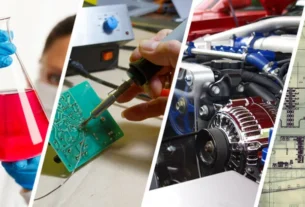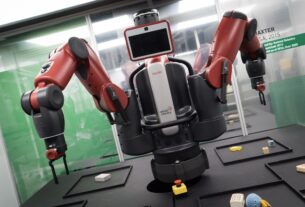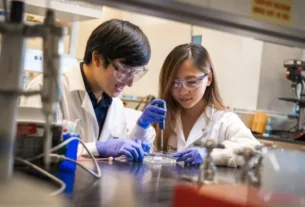Studying science and technology is fundamental to advancing human knowledge, improving quality of life, and fostering economic growth. These fields are pivotal not only for innovation and progress but also for addressing global challenges, enabling informed decision-making, and cultivating curiosity. Here’s an in-depth look at why we study science and technology and the impact these fields have on individuals and society.
1. Expanding Knowledge and Understanding the Universe
At its core, science allows us to understand the world and the universe we inhabit. Through biology, we learn about living organisms; through physics, we explore the forces that govern matter and energy; and through chemistry, we understand the substances that make up everything around us. This foundational knowledge helps humanity answer fundamental questions, such as:
- How does life evolve and adapt?
- What is the nature of matter and energy?
- How did the universe come into existence?
These questions not only enrich human understanding but also fuel curiosity and the pursuit of further knowledge, motivating generations to explore, question, and discover.
2. Driving Technological Innovation and Improving Quality of Life
One of the most tangible outcomes of studying science and technology is the improvement of living standards. Advances in these fields have led to breakthroughs in medicine, transportation, communication, agriculture, and many other sectors that directly impact daily life. For example:
- Medical advancements in technologies like MRI machines, vaccines, and surgical techniques have transformed healthcare, enabling treatments and cures for diseases that once had no hope of remission.
- Communication technology, such as smartphones and the internet, connects people globally, enabling information sharing, education, and collaboration at an unprecedented scale.
- Agricultural technology, including genetically modified crops and precision farming, allows for more efficient food production, helping to combat hunger and food insecurity.
Through innovation, science and technology empower society to solve pressing challenges and improve living conditions around the globe.
3. Addressing Global Challenges
As the world grapples with complex issues such as climate change, resource scarcity, and pandemics, the study of science and technology becomes ever more essential. These disciplines equip us with the tools and knowledge needed to address such crises effectively. Key examples include:
- Climate Science: Research in environmental science helps us understand climate change, its causes, and its effects, enabling us to develop sustainable practices and renewable energy technologies to mitigate environmental impact.
- Public Health: Understanding epidemiology and virology is crucial in combating diseases and preventing pandemics. Scientific research has led to vaccines and public health protocols that save lives and contain outbreaks.
- Sustainable Resource Management: Technology allows for the efficient use of resources like water, minerals, and energy, and the development of alternatives, such as biodegradable materials and clean energy solutions.
By studying these fields, humanity gains the ability to foresee and prevent or adapt to challenges, thereby protecting the planet and ensuring a sustainable future.
4. Fostering Economic Growth and Creating Jobs
Science and technology are powerful drivers of economic progress. They are responsible for the creation of entirely new industries, countless jobs, and the enhancement of productivity across all sectors. Examples include:
- Information Technology: The digital revolution has created millions of jobs in fields like software engineering, cybersecurity, and data science, and has empowered other sectors through automation and data analytics.
- Biotechnology and Pharmaceuticals: Innovations in these areas have led to groundbreaking medical treatments and new ways of producing food, creating a robust industry that contributes significantly to national economies.
- Renewable Energy: As society moves toward clean energy, there is a demand for professionals in solar, wind, and hydroelectric power industries, which provide jobs and contribute to reducing environmental impact.
By fostering a skilled workforce in science and technology, economies become more competitive and are better able to adapt to rapid technological changes.
5. Enabling Informed Decision-Making and Critical Thinking
Studying science and technology cultivates critical thinking, problem-solving, and analytical skills. These are invaluable not only in scientific careers but also in everyday life, where making decisions based on evidence and logic can lead to more effective outcomes. Science education also teaches individuals to evaluate claims critically and recognize misinformation, an increasingly crucial skill in today’s information-rich world.
For example, an understanding of basic science helps citizens:
- Make informed health choices, such as understanding the benefits and risks of vaccines, medicines, and dietary changes.
- Evaluate environmental practices, leading to more sustainable personal and community decisions.
- Understand technological risks and benefits, from data privacy concerns in social media to the potential impact of artificial intelligence.
Through science and technology education, people become empowered to make decisions that benefit themselves, their communities, and society at large.
6. Inspiring Curiosity and Innovation
One of the most profound reasons to study science and technology is to nurture curiosity. When people explore the unknown, they cultivate a mindset that values innovation, perseverance, and creativity. This pursuit often leads to discoveries that were not even anticipated, as curiosity-driven research can open doors to new ideas, technologies, and fields of study.
In schools, science and technology foster a lifelong love of learning and exploration among students. This passion can lead to groundbreaking inventions and societal advancements, as inspired individuals push the boundaries of what we know and what we can achieve.
The Transformative Power of Science and Technology
In sum, studying science and technology is essential for personal and societal growth. It builds the foundation of knowledge that allows humanity to understand our existence and drives technological innovations that enhance our quality of life. It is a tool for solving complex global challenges, creating economic opportunities, and empowering people to make informed decisions. Perhaps most importantly, science and technology spark curiosity and inspire new generations to explore the world and push the boundaries of human potential.



